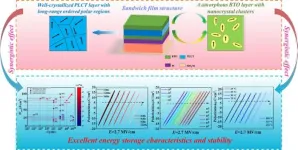(Press-News.org) PHILADELPHIA – When cells in the human body divide, they must first make accurate copies of their DNA. The DNA replication exercise is one of the most important processes in all living organisms and is fraught with risks of mutation, which can lead to cell death or cancer. Now, in a landmark finding, biologists from the Perelman School of Medicine at the University of Pennsylvania and from the University of Leeds have identified a multi-protein “machine” in cells that helps govern the pausing or stopping of DNA replication to ensure its smooth progress.
The discovery, published today in Cell, advances the understanding of DNA replication, helps explain a puzzling set of genetic diseases, and could inform the development of future treatments for neurologic and developmental disorders.
“We’ve found what appears to be a critical quality-control mechanism in cells,” said senior co-corresponding author Roger Greenberg MD, PhD, the J. Samuel Staub, M.D. Professor in the department of Cancer Biology, director of the Penn Center for Genome Integrity, and director of Basic Science at the Basser Center for BRCA at Penn Medicine. “Trillions of cells in our body divide every single day, and this requires accurate replication of our genomes. Our work describes a new mechanism that regulates protein stability in replicating DNA. We now know a bit more about an important step in this complex biological process.”
An enduring mystery of “lagging strand” DNA replication
The DNA replication process is carried out by multiple protein complexes with highly specialized functions, including the unwinding of DNA and the copying of the two unwound DNA strands. The process is akin to a factory assembly line where balls made up of massive, crumpled strings of data are unraveled, allowing specific pieces to be trimmed and copied. Biologists know a good deal about how this process starts and proceeds, but know less about how it is stopped or paused.
Prior studies have identified proteins that stop replication along one DNA strand—the “leading strand”—by inducing the disassembly and recycling of DNA-replication components on that strand. How replication is stopped on the other strand—the “lagging strand”—has been a mystery.
In the study, the researchers used cryo-electron microscopy, CRISPR-based mutation analyses, and other advanced techniques to identify a protein complex that has a central replication-stopping role for the lagging strand.
They showed that this four-protein machine, which they call 55LCC, binds to DNA and its associated replication complex. Powered by two motor-like enzymes called ATPases, 55LCC appears to unfold the tightly folded replication complex, allowing it to be chopped up by protein-snipping enzymes and cleared away. The experiments suggested that this stopping or pausing function of 55LCC is crucial for the smooth progression of DNA replication. When 55LCC is absent, the investigators found, replication is likely to become stuck, and affected cells cease dividing.
“We eventually see massive changes to genome stability in these cells, as their chromosomes fail to segregate properly during cell division,” Greenberg said.
The researchers suspect that 55LCC may be involved in regulating not just the DNA replication process associated with cell division, but also when DNA damaging lesions block replication.
Clinical relevance of a basic science discovery
Inherited mutations in enzymes that help make up 55LCC are known to be associated with childhood syndromes involving hearing loss, cognitive and movement impairments, and epilepsy. The scientists showed in their experiments that these disease-causing mutations tend to reduce the structural stability of 55LCC or affect its interactions with other proteins.
“This work hopefully marks the start of a deeper understanding of these severe neurodevelopmental syndromes,” Greenberg said. “Ultimately, the implications of this finding could be much broader. It could lead to ways to mitigate the clinical issues associated with syndromes stemming from 55LCC dysfunction, which include epilepsy, hearing loss, mental retardation, and bone marrow insufficiency.”
55LCC may also turn out to be a more general tool for protein recycling—another process critical to the health of cells. Greenberg and his team are continuing to study how 55LCC works and is regulated, including understanding the precise signal that tells 55LCC to become active and start unfolding a DNA replication complex.
The other co-corresponding authors of the study were Robert Dilley MD, PhD, a former graduate student in the Greenberg lab, and Elton Zeqiraj, PhD, a professor at the University of Leeds. The work was led by postdoctoral researchers Vidhya Krishnamoorthy, PhD, from the Greenberg lab at the University of Pennsylvania and Martina Foglizzo, PhD, from the Zeqiraj lab at the University of Leeds.
Support for the research was provided by the National Institutes of Health (R01 GM1101149 and CA174904 and P01 CA265794), the Basser Center for BRCA, the Penn Center for Genome Integrity, UKRI-MRC, the Wellcome Trust and the Royal Society.
###
Penn Medicine is one of the world’s leading academic medical centers, dedicated to the related missions of medical education, biomedical research, excellence in patient care, and community service. The organization consists of the University of Pennsylvania Health System and Penn’s Raymond and Ruth Perelman School of Medicine, founded in 1765 as the nation’s first medical school.
The Perelman School of Medicine is consistently among the nation's top recipients of funding from the National Institutes of Health, with $550 million awarded in the 2022 fiscal year. Home to a proud history of “firsts” in medicine, Penn Medicine teams have pioneered discoveries and innovations that have shaped modern medicine, including recent breakthroughs such as CAR T cell therapy for cancer and the mRNA technology used in COVID-19 vaccines.
The University of Pennsylvania Health System’s patient care facilities stretch from the Susquehanna River in Pennsylvania to the New Jersey shore. These include the Hospital of the University of Pennsylvania, Penn Presbyterian Medical Center, Chester County Hospital, Lancaster General Health, Penn Medicine Princeton Health, and Pennsylvania Hospital—the nation’s first hospital, founded in 1751. Additional facilities and enterprises include Good Shepherd Penn Partners, Penn Medicine at Home, Lancaster Behavioral Health Hospital, and Princeton House Behavioral Health, among others.
Penn Medicine is an $11.1 billion enterprise powered by more than 49,000 talented faculty and staff.
END
The lipids in some herbal teas have been identified in detail for the first time, preparing the ground for investigating their contribution to the health benefits of the teas.
Herbal teas are enjoyed worldwide, not only for their taste and refreshment but also for a wide range of reputed health benefits. But the potential significance of a category of compounds called lipids in the teas has been relatively unexplored. Researchers at Hokkaido University, led by Associate Professor Siddabasave Gowda and Professor Shu-Ping Hui of the Faculty of Health Sciences, have now identified 341 different molecular species from five categories of lipids in samples of four types of herbal ...
As a green, sustainable, and competitive technology relative to batteries and electrochemical capacitors and featuring a high charge storage capability, the dielectric capacitors excel in low cost, long cycle-life, and a broad operating temperature range, as well as environmental friendliness, high security, and good reliability. Most importantly, they top other technologies in terms of ultra-high-power density due to their unrivaled charge-discharge speed. These features have created a number of applications for them in power electronic devices and pulsed power equipment. Among the dielectric capacitors, the ferroelectric ones can provide a high energy density due to ...
Joint Press Release with IPB University, WWF Indonesia, and WWF Japan
<Summary Text>
Appropriate fishery management requires an understanding of the target species' stock dynamics. However, in the Northern Hemisphere, illegal trade and IUU (Illegal, Unreported, and Unregulated) fisheries make the assessment of recruiting glass eels extremely difficult. Contrary, we have successfully collected sufficient data on glass eel fisheries for detailed statistical analysis based on a community-based participatory assessment. This study was conducted by NGOs, experts, and a broad range of stakeholders ...
A second-generation melanoma vaccine being developed at UVA Cancer Center improves long-term survival for melanoma patients compared with the first-generation vaccine, new research shows. Interestingly, the benefit of the second-generation vaccine was greater for male patients than female patients. That finding could have important implications for other cancer vaccines, the researchers say.
The vaccine developers, led by Craig L. Slingluff Jr., MD, found that they could enhance the effectiveness of their melanoma vaccine by simultaneously stimulating important immune cells known as “helper ...
Waltham — March 26, 2024 — Low health literacy is a problem for a substantial proportion of people with moderate to severe traumatic brain injury (TBI), according to research published in The Journal of Head Trauma Rehabilitation (JHTR). The official journal of the Brain Injury Association of America, JHTR is published in the Lippincott portfolio by Wolters Kluwer.
Angelle M. Sander, PhD, FACRM, Professor in the H. Ben Taub Department of Physical Medicine and Rehabilitation at Baylor College of Medicine and Director of TIRR Memorial Hermann’s Brain Injury Research Center, ...
A Canadian-led study has identified genes which may be partially responsible for the development of cerebral palsy.
Cerebral palsy (CP), a condition that affects the development of motor skills in children, is the most common childhood-onset physical disability. CP can have different causes, such as infections, injuries, or lack of oxygen before or during birth, but the genetic contributors to CP have remained largely unknown.
Novel research from scientists at The Hospital for Sick Children (SickKids), the Research Institute of the McGill University ...
When people present themselves as capable or humble, the way this influences other people’s evaluations of one’s true ability and character depends on one’s usual performance. Kobe University and University of Sussex researchers thus add an important factor in our understanding of how the relationship between self-presentation and perception develops with age.
People want to be liked. Amongst the many ways of achieving this, making statements about oneself to manipulate other people’s evaluation is called “self-presentation.” Both the ability to do so and the effect this has on others’ evaluation of one’s ability ...
University of Leeds news
Embargo: Thursday 28 March 2024, 23:30 UK time
Do sweeteners increase your appetite? New evidence from randomised controlled trial says no
Replacing sugar with artificial and natural sweeteners in foods does not make people hungrier – and also helps to reduce blood sugar levels, a significant new study has found.
The double blind randomised controlled trial found that consuming food containing sweeteners produced a similar reduction in appetite sensations and appetite-related hormone responses ...
The guidelines for weight gain during pregnancy in obese women have long been questioned. New research from Karolinska Institutet supports the idea of lowering or removing the current recommendation of a weight gain of at least 5 kg. The results are published in The Lancet.
International guidelines from the US Institute of Medicine (IOM) state that women with obesity should gain a total of 5 to 9 kg during pregnancy, compared to 11.5 to 16 kg for normal-weight women. The guidelines have long been questioned, but there has been no evidence to warrant a re-examination.
A new study from Karolinska Institutet in Sweden now shows that there are no increased health risks for either the mother or ...
Authors say the findings underscore the urgent need for preventive measures for people with MS who are inadequately protected by COVID-19 vaccination alone.
*Please mention the European Congress of Clinical Microbiology and Infectious Diseases (ECCMID 2024, Barcelona, 27-30 April) if using this material*
New real-world research being presented at this year’s European Congress of Clinical Microbiology and Infectious Diseases (ECCMID 2024) in Barcelona, Spain (27-30 April) reveals that people living with multiple sclerosis (MS) face a much higher ...




